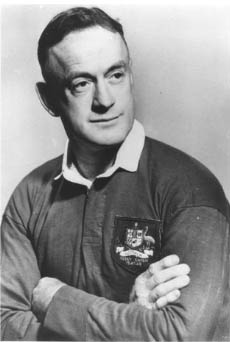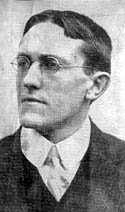
Cyril Towers was an Australian rugby union player, a state and national representative centre who made 57 appearances for the Wallabies, played in 19 Test matches and captained the national team on three occasions in 1937.
Kenneth William Catchpole was an Australian rugby union footballer. A state and national representative half-back, he played twenty-seven matches for Australia, thirteen as captain. Catchpole rose through the ranks at the Randwick club as a young man, before making his debut for New South Wales at only 19 years of age, then captaining Australia at age 21. He is considered one of Australia's greatest rugby scrumhalves.

William Malcolm McLean was an Australian soldier and a state and national representative rugby union player who captained the Wallabies in five Test matches immediately after World War II.
Trevor Allan was an Australian dual-code rugby international who captained Australia in rugby union before switching to rugby league with English club Leigh.
Alan Stewart Cameron was an Australian rugby union footballer of the 1950s and 60s. A State and national representative lock-forward he made twenty Test appearances and over fifty additional tour match appearances for the Wallabies, captaining the national side in four Tests matches.
Between July 1947 and March 1948 the Australia national rugby union team – the Wallabies – conducted a world tour encompassing Ceylon, Britain, Ireland, France and the United States on which they played five Tests and thirty-six minor tour matches. It was the first such tour in twenty years, since that of the 1927–28 Waratahs, as the 1939–40 Australia rugby union tour of Britain and Ireland tour had been thwarted by World War II. They were known as the Third Wallabies.
Colin "Col" Windon, was a rugby union player and soldier who captained Australia – the Wallabies – in two Test matches in 1951. By age 18 Windon was playing at flanker for his club Randwick in Sydney's Shute Shield. After serving with the Second Australian Imperial Force in the Pacific Theatre during the Second World War, Windon resumed his rugby career in 1946. He was first selected for Australia for their tour of New Zealand that year. Despite the Wallabies losing both their Tests on tour, Windon impressed with his play.

Herbert John Solomon was an Australian rugby union player, a state and national representative versatile back who captained the Wallabies in eight Tests in the 1950s and led the touring squads to New Zealand and South Africa.
Steve Williams is an Australian former state and national representative rugby union player who captained the Wallabies in five Test matches in 1985.

Herbert Michael "Paddy" Moran was an Australian rugby union player, a state and national representative flanker who captained the Wallabies on their first overseas tour in 1908–09, and a medical practitioner and anti-cancer activist.

Frederick Wood was an Australian rugby union player, a state and national representative half-back. He was vice-captain of the Wallabies on their first overseas tour in 1908–09 and later captained the side in Test matches in 1910 and 1914. His representative career lasted from 1905 to 1914.

Anthony Alexander Shaw is an Australian former rugby union player. A Queensland state and national representative flanker, Shaw captained the national side consistently from 1978 to 1982.
The 1981–82 Australia rugby union tour of Britain and Ireland was a series of matches played by the Australia national rugby union team. The touring team played twenty-three matches between October 1981 and January 1982, winning sixteen games, drawing one and losing six. The scheduled final game, against the Barbarians, was cancelled due to heavy snow.
The 1975–76 Australia rugby union tour of Britain and Ireland was a series of matches played by the Australia national rugby union team. The team was referred to as the "Sixth Wallabies", although they were actually only the fifth Australian touring team to undertake a full tour of Britain & Ireland; the "Second Wallabies" of 1939–40 had to return home without playing a game when the World War II broke out.
Peter David Sullivan is an Australian former national representative rugby union player. He represented for New South Wales and Australia, captaining the national side on eleven occasions from 1972 to 1973.
Robert Alfred Lewars Davidson (1926–1992) was an Australian rugby union footballer of the 1940s and 50s. A State and national representative prop-forward he made thirteen Test appearances and forty-nine additional tour match appearances for the Wallabies, captaining the national side in six Tests matches from 1957-58.
Ron Walden was an Australian state and national representative rugby union player who captained the Wallabies in three Test matches in 1936.
Neville Cottrell (1927–2014) was an Australian rugby union footballer. A Queensland and national representative forward, he played fourteen Test matches for Australia, including two as captain.

Peter George Johnson was an Australian international rugby union player. He enjoyed a long state and international career throughout the 1960s and made 92 national appearances for his country. He captained the Australian side in five Test matches.
Geoffrey Arnold Shaw is an Australian former national representative rugby union player who played for and captained the Wallabies. He made state representative appearances for both New South Wales and Queensland over an eleven-year period from 1969.